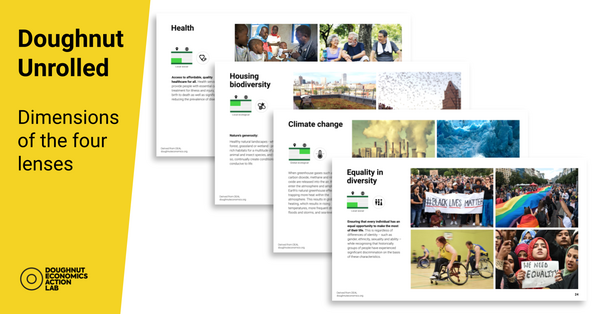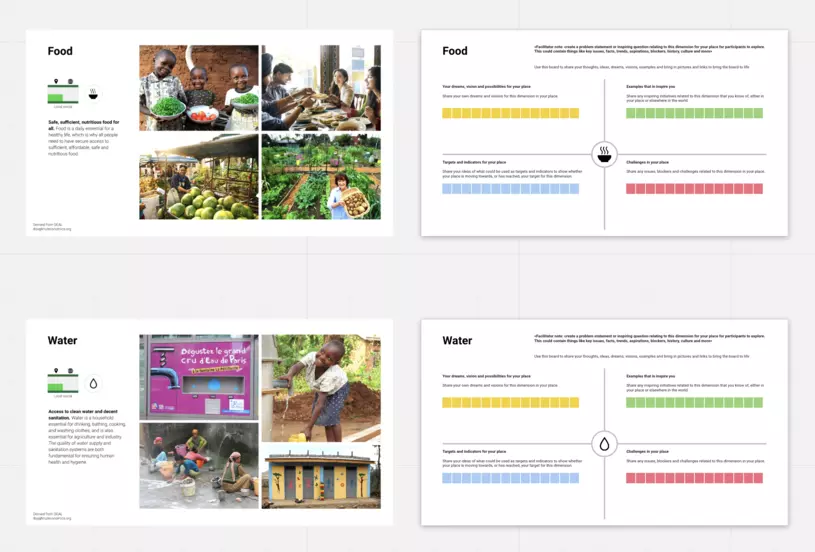
Doughnut Unrolled: Dimensions of the four lenses
An overview of each of the dimensions of the four lenses on life

Version 1.0 (April 2022)
📢 Now translated into French, Spanish, German and Brazilian Portuguese
Overview
The goal of the Doughnut is to meet the needs of all people within the means of the living planet, but what does this mean for the neighbourhoods, cities, districts or nations where we live?
To help you explore this question we've created Doughnut Unrolled, a concept that takes us from the Doughnut to four 'lenses' that invite you to look at the interplay between local aspirations and global responsibilities in your place – both socially and ecologically – and identify possible entry-points for transformative action.
.png)
This tool - Dimensions of the four lenses - introduces each of the dimensions of the four lenses on life that we get when we unroll the Doughnut.
- Open the tool in the following languages here:
- Open the Miro canvases in the following languages here:
- All pdf canvases available here
We've also created a set of canvases in Miro (password: fourlenses), pictured below, that is designed for you to copy, or 'duplicate' into your own Miro account. If you don't have a Miro account, you can create one for free, very easily - that will give you space for three boards.
Dimensions of the four lenses is one of five Doughnut Unrolled tools that work together to apply the ideas of Doughnut Economics to your place:
- Introducing the four lenses
- Community Portrait of Place
- Data Portrait of Place
- Exploring a topic
- Dimensions of the four lenses (this tool)
Together they help you create a 'Doughnut Portrait' of your place - a holistic picture with diverse inputs and perspectives - that can act as a starting point for transformative action.
.png)
Whilst we are launching these tools in English we are also kicking off a process for translating all 5 tools into some languages and we will share more details of this in the following weeks.
Why use it?
Dimensions of the four lenses complements the tool Introducing the four lenses by going into each of the dimensions of the four lenses to provide a short text on each dimension and some illustrative images. In addition to a short introductory text for each dimension, for the local-ecological lens, we offer some example ways in which cities and places could aim to match the generosity of nature. And for the global-social lens, we offer examples of the actions and decisions taken by people and organisations in one locality that can result in many kinds of impacts – beneficial or harmful – in the lives of people worldwide. By reviewing these examples it helps with the exploration of the four lenses in the other Doughnut Unrolled tools.
Who is it for?
This tool is for anyone who wishes to explore what the ideas of Doughnut Economics means for them in their place.
Important note: If you wish to use these tools as part of your consultancy or professional advisory services for others, then we require that you follow DEAL's policy for consultancies and professional advisors.
How long does it take?
The slides take about 30 minutes to read.
How many people is it for?
Any number of people who you wish to share the slides with, in whatever context, whether a presentation, workshop or other.
What materials do you need?
You do not need specific materials for this tool, however the workshop tools (see Community Portrait of Place and Exploring a topic) require material preparation, such as four lenses canvases, pens and sticky notes.
What does the facilitator need to know or be able to do?
If you are facilitating a process to introduce others to the four lenses, we recommend you familiarise yourself with these slides, then consider how they might support your process to explore the four lenses, whether as supporting material for a workshop, as a workshop for each dimension in itself, or any other use.
If you are unsure about any of the dimensions of the four lenses and would like to ask a question, please either leave a comment below, or contact the DEAL Team directly via the contact form and choosing the category 'Tools and Stories'.
Acknowledgements
This tool was created by Rob Shorter, Kate Raworth, Leonora Grcheva and Andrew Fanning of the DEAL Team, in collaboration with Ruurd Priester.
The four lenses builds upon the methodology of Creating City Portraits co-created with Biomimicry 3.8, Circle Economy, and C40 Cities.
We would like to thank the DEAL Community members who reviewed and tested this tool and offered feedback that helped in its development, including Nicole Hagerman Miller of Biomimicry 3.8, Ilektra Kouloumpi of Circle Economy, Elizabeth Kelly and Monika Milewska of C40 Cities and Mat Siffels of Amsterdam Donut Coalition. For anyone we’ve missed, thank you, and do let us know so we can acknowledge your contribution here.
We would also like to thank Iconmonster for the icons used.
Links
- Open the tool in the following languages here:
- Open the Miro canvases in the following languages here:
- All pdf canvases available here
Feedback
Healthy living systems rely on good feedback loops and we invite your comments, reflections and suggestion from using this tool to help us iterate and evolve for future versions.
You can do this two ways:
- The first is to leave a comment in the section below called Join the conversation. The benefit of this approach is that everyone can see and benefit from what you share.
- The second way is to contact the DEAL Team directly via the contact form and choosing the category 'Tools and Stories'.
Share
Share
-
Story

An Oxfordshire Doughnut Economics Project
🍩 We're delighted to share the final report from a recent Oxfordshire Doughnut Economics project !
-
Story

Student project: Sport organisations and Doughnut
A student project at the Univeristy of applied Manaement looked into how the Doughnut can be implement in sports
-
Story
%2021.27.57_ddeabf3d.jpg)
Donut para Cidades E02
Material do 2o Encontro Donut para Cidades
-
Story
.png)
ACT! as a Doughnut Project in Frankfurt
An innovate, non-formal education programme with Doughnut economics at the heart. These are it's outcomes in Germany!
-
Story

Donut for Cities Workshop: Brazil´s context
A Workshop to explore the 4 Lenses tools for Building Prosperous and Resilient Cities in Times of Climate Emergency
-
Story

Doughnut in urban development in Grønlikaia, Oslo
A new fjord district in Oslo has been using Doughnut Economics to help guide the urban development.
-
Story

Being with Doughnut Economics
A three-hour exploration of economics as ecological, adopting the lens of Doughnut Economics.
-
Story

Downscaling the Doughnut to Chapel Hill
As part of a student-led class at UNC-Chapel Hill, students created a model to downscale the doughnut to Chapel Hill.
-
Member


Derek von Behr
Brasília, Distrito Federal, Brasil
Architect, urban planner and landscaper
-
Member


Brian McConnell
Roanoke, Virginia, United States of America
As a 'consciousness' practitioner, writer, initiator of the Southwest Virginia Regenerative Ecoregion, and co-founding director of a 501(c)(6) nonprofit corporation, Brian works in small group settings to envision, innovate, and subsequently design, community-based value and learning systems interrelating with others across "distributed networks".
-
Member


Ward Stirrat
Vancouver, British Columbia, Canada
-
Member


Carolina Tomaz
Brazil
I describe myself as a XXI century economist, who adopts systemic and transdisciplinary thinking, and understands the world as a complex socio-ecological system. My goal is to work with regenerative projects for the development of inclusive, intelligent, and sustainable cities and communities. I have been particularly interested in applying the Doughnut economy model for cities, business and organisations. I have experience with projects planning and management, structuration and implementation of new governance models, and group's facilitation collaborative methods to co-create more effective and sustainable solutions for social problems. I'm part of the Donut Brasil network, and together we are experiencing the tools and knowledge of the Doughnut Economics in many projects and in the Latin America and Brazil contexts.
-
Member


Rita Reid-Smith
Brantford, Ontario, Canada
Software industry professional with a commitment to customer advocacy and problem solving.
-
Member

Detlef Krusekopf
-
Member


Carra Santos
Bath, BANES, UK.
I'm an established and creative sustainability professional, equipping visionary leaders, educators and advisors with knowledge and navigation tools to step into their sustainable futures roles, through education, strategy and communication. Over 20+ years, my career in creativity, design and communication has evolved from internationally-acclaimed product innovation and future concepts for world-class events, to creative thinking skills for visionary leadership. My approach is influenced by my career origins in multidisciplinary concept generation and development - tapping into food, fashion, interiors, furniture, exhibition, spatial and urban design - and my personal passion, which is exploring how transformative habits, attitudes, practices, behaviours and relationships can be facilitated by forward-thinking design and communication. I began exploring Doughnut Economics around 2017, attending events from 2019, and becoming a DEAL community member on its launch in 2020. My interest in economics increased during my 2021 'Sustainable Development in Practice' Masters dissertation on narrative framing and communication of sustainability practices to UK business leaders, which touched on the difference between degrowth, growth-agnostic and growth-led perspectives. I started the Doughnut Economics group in Bath, UK in 2022, and and continue to support it and a number of councils, universities and enterprises with local outreach and engagement. Email me or join me on LinkedIn.
-
Member

.jpg)
Jennifer Brandsberg-Engelmann
Frankfurt am Main, Hessen, Germany
